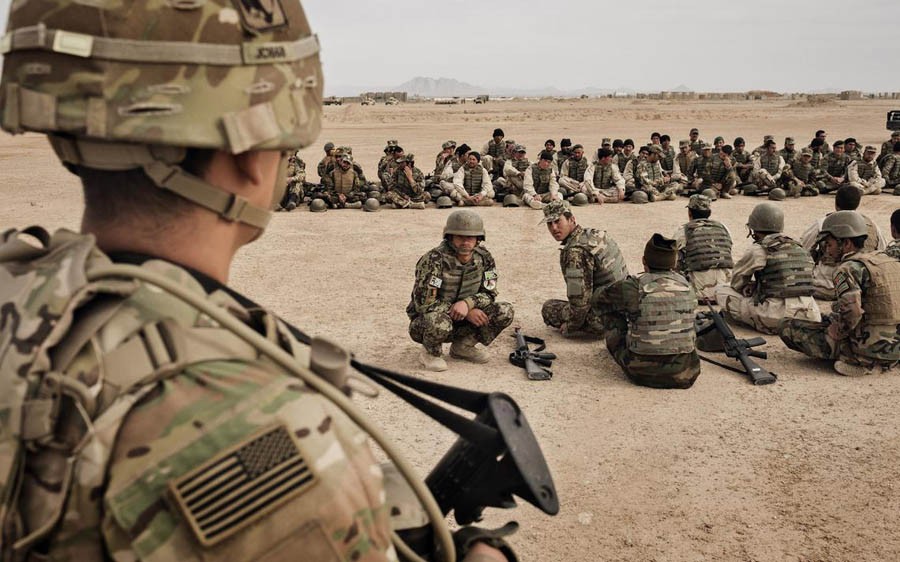
The US should condition its complete withdrawal with Taliban discarding their militia character and contesting elections as a political party

Afghan news channel TOLO News quoted sources familiar with the ongoing talks in Qatar that American negotiators and their Taliban counterparts have "reached some kind of agreements" on foreign troops’ withdrawal conditioned with Taliban’s counter-terrorism guarantees. The two sides have deliberated on the details of these agreements, the news channel added. Probably, for the very first time, competing parties have converged on sharing same opinions about the success of Afghan peace efforts.
Every party, with the exception of Afghan government, is upbeat regarding the steady progress of peace talks. What may appear as some sort of solace for the otherwise sidelined and alienated Afghan government, Zalmay Khalizad had asked the Afghan government to form a national team to engage in talks with Taliban before he engaged in talks with Taliban in Doha Qatar. On the other hand, the negotiators, the US government and Afghan Taliban, and other main stakeholders -- Pakistan, Russia and Iran -- all appear satisfied with the ongoing negotiations.
Russian Foreign Minister Sergey Lavrov, who happened to be in Qatar when the fifth round of talks was underway, reiterated Russian backing of the talks. Similarly, Pakistani leaders, contended with US-Taliban direct negotiations, have been getting credit for facilitating Afghan peace talks. The irony is that the otherwise rival regional state actors are satisfied with Afghan peace negotiations. This begs the question why?
These contending parties agree that the US forces should be out of Afghanistan. They seem convinced that the US under Trump has been doing just exactly what they want. When he announced his South Asian strategy back in August 2017, US President Donald Trump might have conveniently glossed over other important points of the strategy, he stuck to one -- Trump’s ‘original instinct’. "My original instinct was to pull out -- and, historically, I like following my instincts." In the same breath, he continued, "but all my life I’ve heard that decisions are much different when you sit behind the desk in the Oval Office".
In his latest piece titled "Negotiations Are the Best Way to End the War in Afghanistan", in the Foreign Affairs magazine, Barnett R. Rubin, an expert on Afghanistan, argued: "…the real danger is that, regardless of the negotiations, Trump will order an unconditional withdrawal and cut the assistance that sustains the Afghan state." Thus, Trump’s Afghan war policy of withdrawal is Washington’s Achilles’ heel in its dealing with Taliban and their abettors.
Trump has found a voice which echoes with his. Republican Senator Rand Paul and Democratic Senator Tom Udall, two American senators, have introduced the 2019 American Forces Going Home After Noble Service (AFGHAN) Act in the US Congress. The bi-partisan piece of legislation seeks to declare victory in Afghanistan and calls for the withdrawal of US forces from Afghanistan.
The bill is reminiscent of Congress’ weariness with the Vietnam War when the lawmaking body’s decision to cut off financial and military aid to South Vietnam triggered the fall of Saigon in 1975. "The Afghan war has cost the US $2 trillion, with the war currently costing over $51 billion a year," stated Paul while laying emphasis that the amount can be redirected to US domestic priorities.
Regional states’ support to Taliban is merely transitory. They seem to be under the impression that some semblance of state in Afghanistan is better than none at all. For them, Taliban appear to be more organised and powerful to hold sway in the width and breadth of Afghanistan rural areas than the incumbent Afghan government, which is getting confined to urban centres only.
Jawad Zarif, the former Iranian Foreign Minister, told NDTV in January 2019 that Iran had intelligence contacts with Taliban in order to secure border areas. Likewise, the Russian support to Taliban, like in the case of Pakistan and Iran, might stem from the fear of a permanent US presence in the Russian backyard. Secondly, Russia sees ISIS as a graver Islamist threat than Taliban who are not as harsh in their interpretation and implementation of Islam as the ultra-Salafist ISIS.
Except Pakistan, the rest of the neighbours of Afghanistan would try to prevent the country becoming dominated by Taliban. "I think it would be impossible to have a future Afghanistan without any role for the Taliban," Zarif told NDTV. "But we also believe that the Taliban should not have a dominant role in Afghanistan."
There is little to no veracity in the argument that Taliban have changed for the better. On March 1, Gandhara, a news and analysis website with focus on Afghanistan and Pakistan, reported that Taliban have kept reviving their harsher, stricter and narrower version of Shariah in parts of Badakhshan province. "They [Taliban] do not allow women to step outside without a male guardian", Gandhara’s story reported a woman to have said so.
In other parts of Afghanistan, such as parts of Helmand, Kandahar and Uruzgan, Taliban are reported to have softened their stance on female education, use of modern technology and listening to music and watching television, venues that were forbidden under Taliban before they were ousted back in 2001. Afghan Taliban have softened their stance on Shariah punishment just to gain public sympathy. In the eventuality of their control over Afghanistan, Taliban are poised to reverse the clock to 1996 when they were ruling large portions of Afghanistan.
The US should confine to a few military bases and condition its complete withdrawal with Taliban discarding their militia character and contesting elections as a political party. Taliban and their backers will be left with no option other than to mend their ways.